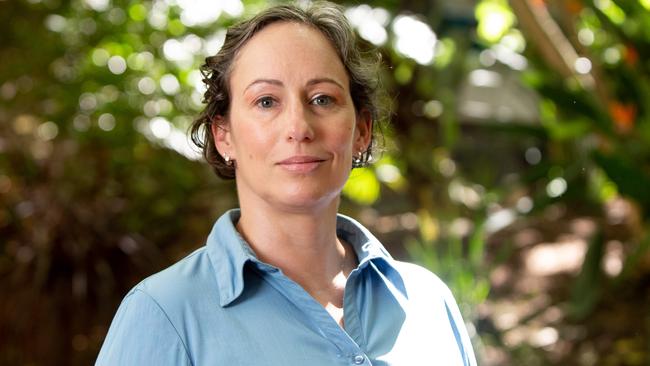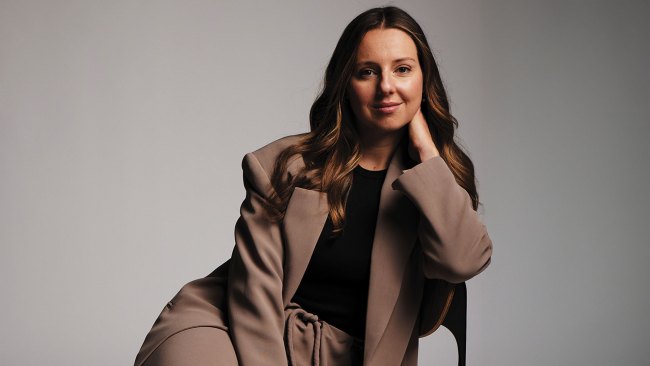Mum Cherie Lee lifts lid on the realities of undiagnosed perimenopause
At 43, Cherie Lee was in such crippling pain she thought she had a life-threatening disease. Doctors didn’t have the answers until a friend intervened.
Lifestyle
Don't miss out on the headlines from Lifestyle. Followed categories will be added to My News.
Cherie Lee’s life started to fall apart when she turned 43.
The early childhood worker found herself crippled by muscle and joint pain, so overwhelmed by fatigue that she was scared to drive and hurtling in a downward spiral.
“It could have got to (suicidal thoughts) if I hadn’t got the help I needed. It was scary,” said the now-47-year-old, who had felt “fabulous” in her 30s.
“I thought I’d have to quit my job, I couldn’t parent, I couldn’t function.
“My husband and I looked at selling our house and downsizing because I thought I’d have to give up work. He was so scared, he didn’t know what to do.”

With doctors saying she was too young for menopause, the distraught mum-of-one was left feeling convinced she was battling a serious, life-threatening illness because her symptoms were so extreme.
But a chance conversation with a friend, who had found out she was perimenopausal at the age of 37, changed everything.
“All of her symptoms aligned with what I was going through,” said Mrs Lee, who found a GP to prescribe her menopause hormone treatment.
“Immediately, it felt like I was getting my life back. MHT has been a miracle … It has now become my best friend.”

It comes as a groundbreaking Adelaide-based study has revealed the shocking reality for perimenopausal and menopausal women who “suffer in silence”, with one in five respondents reporting they were so devastated by their crippling symptoms that they had contemplated suicide.
Adelaide researcher Associate Professor Erin Morton, who launched the VITAL longitudinal survey last October and has already had more than 1300 perimenopausal and menopausal women respond, said its preliminary results were confronting and challenging.
“That number of women having suicidal thoughts would have absolutely stunned me before I was in perimenopause … (now) it doesn’t shock me at all,” said Associate Professor Morton, who was hit by overwhelming brain fog and depression four years ago at the age of 42.
“This is what the raw numbers are showing. Those responding may have had other conditions … but what it is showing is that some people are having these horrendous symptoms.
“They’re going through so much pain and agony and their families … and you just think if we knew about this, they could get it treated and go back to normal life.”
Associate Professor Morton said the VITAL survey also revealed that 75 per cent of women who responded had a symptom related to mental health or brain fog and executive function.
“The survey shows that women want to be heard,” she said.
“There has been so little done till now. The one takeaway for those people who have got to the right care – they’re wonderful, back to the way their lives were before.”
Adelaide clinical psychologist Dr Emma Johnston has seen the devastating toll wreaked by the hormone fluctuations of perimenopause and menopause, which marks the end of a woman’s menstrual cycle and can occur between the ages of 40 and 59.
Dr Johnston said crippling symptoms, including loss of libido, poor body image, brain fog, hot flushes, depression and anxiety, could become a “recipe for disaster” for women’s mental health, personal relationships and work lives.

She said the initial results revealed in the VITAL survey were “a big wake up call for clinicians to be more aware of heightened suicide risk to ensure that these women can more easily present for treatment, feel validated in their distress and have the opportunity for their physical and mental health symptoms to be treated seriously”.
“This research definitely calls for greater efforts to educate women and health practitioners on the potential devastating effects of perimenopause and menopause so that women can seek help for both physical and mental health symptoms,” she said.
“Menopause is slowly being talked about more but I don’t think it’s being talked about enough.”
A parliamentary inquiry into the impacts on women’s physical and mental health, economic circumstances, how the health industry manages treatments and symptoms and the overall stigma associated with perimenopause and menopause is expected to report its findings this September.
Deputy chair SA Senator Marielle Smith said perimenopause and menopause had been “kept in the dark” and she hoped the inquiry would help “shine a light” and “spark a louder public conversation, and lead to meaningful health, social and economic policy responses that will make a real difference in women’s lives and in their health outcomes”.
“We cannot let these women’s voices go unheard, their pain dismissed, or their experiences undervalued any longer,” she said.
Dr Louise Newson, an England-based world leader on menopause, said 88 per cent of new patients to her clinic in Stratford-upon-Avon had symptoms of low mood.
She said many perimenopausal and menopausal women were prescribed antidepressants for their symptoms when the right dose of menopause hormone therapy could “be really beneficial for many women at improving these symptoms”.
Now, Mrs Lee is keen to share her new-found wisdom with other perimenopausal and menopausal women and “get loud” about the traditionally silent, but often traumatic, phase of life.
The motivated “menopause warrior” has started a Facebook page – Adelaide Peri/Menopause Support Group – to offer support and open discussion for all women struggling through “the change”.
“I want to make it better for other women, so they don’t have to go through what I did,” she said.





